Miracle Mile (1988)
Directed by: Steve De Jarnatt
Written by: Steve De Jarnatt
Starring: Anthony Edwards, John Agar, Lou Hancock, Mare Winningham
USA
AVAILABLE ON DUAL FORMAT BLU-RAY AND DVD: NOW, from ARROW VIDEO
RUNNING TIME: 87 mins
REVIEWED BY: Dr Lenera, Official HCF Critic
In Los Angeles, Harry Washello and Julie Peters meet at the La Brea Tar Pits Museum and immediately fall in love. After spending the afternoon together, they arrange to meet after her shift ends at midnight at a nearby coffee shop, but a power failure means that Harry’s alarm fails to wake him and Julie heads for home. When Harry awakes that night he rushes to the shop and tries to call Julie on a pay phone, but only reaches her answering machine. The phone rings again and Harry picks it up and hears a frantic man telling his dad that nuclear war is about to break out in less than fifty minutes, after which it sounds like he’s shot. After the caller realises he has dialed the wrong area code, a different voice tells Harry to forget everything he heard and to go back to sleep before disconnecting….
The first thing I should probably say about Miracle Mile is that this is one film which probably works best on a first time viewing if you know very little about it so you may wish to skip this review and not read it till after you’ve seen the film. I am reviewing it, so I will divulge a few things though I’m not going to tell you how it pans out and will do my best to be a bit vague in places, but if you’ve never seen it and want to be surprised, take my word for it and just buy Arrow Video’s Blu-ray release of the film right now, because I think you’ll be very pleased that you did, unless you really know need to know a bit more about a film before you watch it – though even if you do read this review you may want to skip the next paragraph which doesn’t give you concrete details on an important aspect of the film but may cause you to pick up on something very important. And actually don’t neccessarily take my word for it – take other people’s word for it because this is a film which isn’t that well known despite it having done okay at the box office during its theatrical release but which to my knowledge is liked by nearly everybody who sees it. I remember browsing the IMDB about a year ago and looking at the discussion forum of Miracle Mile [if you’re fairly new to the IMDB, yes, they had discussion forums for every single film before they shamefully got rid of them] and every single person who posted on it said they liked it, most of them a great deal, and some were surprised and annoyed that it hadn’t crossed their paths before. I seem to recall a couple weren’t sure about the ending, but then neither was I when I watched it on an ex-rental video I bought. Seeing it again now after far too long [inexplicably I never bought the DVD for some reason], I realised that the ending was exactly the right choice.
Stefe De Jarnatt actually wrote the script in 1978 for Warner Bros. but they wanted to make it on a bigger scale and didn’t want to entrust the project with a first-time director. However, they didn’t know who to entrust it to and it sat on the shelf, though it soon garnered a reputation as one of the best unfilmed screenplays around. De Jarnatt eventually bought it back, but then Warners offered him a huge amount of money for the screenplay to form the main part of Twilight Zone: The Movie, which would have consisted of only this story instead of the four segments it eventually became. It would also have had a different ending with a Twilight Zone-style twist so De Jarnatt refused. He spent the next few years trying to set it up, with many studios turning it down, principally because of the ending, though production nearly begun with both Nicolas Cage and Kurt Russell. Eventually Hemdale Films agreed to fund it on a small budget, while allowing De Jarnatt, only on his second feature, to keep his ending. It was shot in seven weeks mostly at night. De Jarnatt had to complete shooting on many scenes at his own expense after principal shooting had wrapped on most days. It was generally well recieved by critics and it became a major success on video, though since then it seemed to almost disappear, partly because Hemdale went bankrupt and it never got a decent DVD release.
So what we basically have here is a mixture of idealistic love story, absurdist dark comedy and nightmare nuclear thriller, and these elements may sound disparate but in the hands of De Jarnatt they work a treat and result in something quite unique, though if you want a point of comparison then After Hours is the first example that comes into my head. “Where do you begin”? asks Harry at the beginning as we see Julie reflected right at the end of his trumpet and his voiceover is a bit unnecessary during a couple of early moments. Some might say the same about footage from a TV programme about the creation of the universe and the evolution of life, though it reminds us throughout of the irony of the human race having evolved so much that it has the power to undo all that it has achieved and to destroy itself. Trumpet player Harry and waitress Julie’s first encounter takes place under the opening credits, first him noticing her and then her noticing him as the camera pans along parts of the museum. They spend a romantic afternoon together and for a moment I wished the film had spent longer with this bit, showing how the two connected, until I realised soon after that it wasn’t essential. All we need to know is that they’ve both quickly fallen in love and are made for each other, and Anthony Edwards and Mare Winningham have the essential chemistry to make us believe this. The only real mistep perhaps is her comment to him before they part: “I’ll screw your eyes blue”. It just didn’t seem believable coming from Julie, and it slightly weakened the romantic mood.
So here are two people who’ve just spent probably the best afternoon of their lives, and who also probably think that the best is yet to come, but a few later seem to be stuck in the worst night of their lives. Harry, confused and not entirely convinced of the reality of the information he hears, wanders back into the diner where Julie works and tells the other customers what he’s heard. The patrons, who include a transvestite [whom nobody remarks about, and there’s also a heroic gay character later], an air hostess and an older man telling sex jokes to the guy next to him, scoff at his story until one of them, a mysterious businesswoman named Linda, calls a number of politicians in Washington on her wireless phone and finds that they are all visiting South America at the same time. This whole diner sequence is quite remarkable and almost a little movie in itself, or should I say a play – odd but somehow very funny despite the desperation of the situation. Convinced of the danger, Linda immediately charters several private jets out of Los Angeles to a compound in a region in Antarctica with no rainfall. Most of the customers and staff leave with her in the owner’s delivery van but, when the owner refuses to make any stops, Harry, unwilling to leave without Julie, arranges to meet the group at the airport and jumps from the truck to go get Julie, helped and hindered by various strangers, most of whom are initially unaware of the impending apocalypse, and even causing several deaths – and that’s all I’m going to tell you of the plot. It’s mainly very episodic and has a picaresque quality yet also at the same time becomes more and more nightmarish yet is also terrifyingly believable as, in real time, we get, minute by minute, closer to a possible apocalypse while people turn to progressively more extreme behaviour. I especiallly liked the yuppie taking every single drug he can find.
One of the things that helps greatly is that we’re never sure about the true nature of that phonecall right up until the very end. Was it genuine? Was it a cruel practical joke? Or did Harry just totally misunderstand what he heard? He wants everybody he meets to know what he thinks is the awful truth, but if he tells it to them they may not believe or help him, yet if he tells them a more believable lie, he could be denying them the chance to survive or at least to die with their loved ones. Personally if I was in a place that was probably soon to be destroyed in a nuclear attack, I wouldn’t want to know about it whatsoever. Whilst the depiction of most of the folk Harry meets leans towards the quirky, nocturnal Los Angeles – superbly lensed by Theo Van de Sande with an emphasis on red almost everywhere – being mostly populated by a variety of oddballs often played by the kind of recognisable face you’ve seen in “this” movie and “that” movie to whom you may have trouble putting a name to but who made an impression, I never felt that we were anywhere else and the feeling of desperation is never absent. We also deeply feel for the central couple, and want them to find each other even if it may seem that there’s little point in them doing do. And especially wonderful is an elderly couple [B-movie sci-fi legend John Agar is the male] suddenly reuniting even though they start arguing as soon as they get in his car. So poignant, so funny, so human – and it almost made me cry. The good side of humanity is shown almost as much as the bad.
The low budget doesn’t hamper things at all with even some decent crowd scenes towards the end. I haven’t seen Cherry 2000, De Jarnatt’s other feature which totally flopped, but he seems to have a very smooth filming style with lots of long takes, perhaps the most notable one going through a fitness centre. A bit where Harry gets up on top of his car and he – and we – are startled by what he sees will also leave a great impression. The writer/director bafflingly only made various TV series episodes since and then disappeared from the industry. Some of the background symbolism is very on the nose, like a shop full of clocks, but it does show how much thought has been put into every other shot and scene. Anthony Edwards is absolutely outstanding in the lead role as a kind of “everyman”, the role often requiring him to evoke changes in emotion without dialogue while the camera remains fixated on his face. Winningham is less impressive, though her part is really quite a bit smaller and her character not very well fleshed out anyway. Tangerine Dream’s score does instantly date the film though has moments of great calm and beauty, as well as brooding suspense and frantic action. The band had just lost one of its members and was therefore reduced to a duo, though you wouldn’t know it hearing the music. Existential yet unpretentious, frightening yet full of heart, Miracle Mile is one of 1988’s finest.
Kino Lorber brought this out on Region ‘A’ and as is customary, Arrow have used their version as a basis but probably done a new encode. There are a few scratches and specks around the beginning and a line briefly going down the screen towards the end, but otherwise Miracle Mile looks marvellous on Arrow’s release. The prominent reds leap off the screen and the level of grain is just right. Kino gave the film an impressive selection of special features, meaning that Arrow could have simply ported them over and left it that at, but as usual they have gone the extra mile and added some extra stuff, beginning with a 46 minute interview with De Jarnatt which is well worth your time. After amusingly beginning by giving a deliberately pretentious [or is it?] explanation of what Miracle Mile is about, he goers on to discuss how he got into the business, his short film and Cherry 2000, and then Miracle Mile in considerable detail. There were a couple of production details I didn’t know about, such as the main difference between the first draft and the final one, and he even tells of what he does now since he left the business. He says that he may return to do another film one day but was clearly thoroughly burnt out by his Miracle Mile experience.
Harry and Juliet is a 12 minute reunion of Edwards and Winningham, who fell in love for real soon after doing this. There are no major revelations but it’s nice to watch. Reunion at Johnie’s runs 20 minutes and consists of most of the supporting cast and two crew members getting together at the diner in the film. We eavesdrop on parts of interesting conversations and we get some good observations from some. Some are asked if they think their character survives or not, others talk about fans or the ending. It’s really heartwarming, but seemed a bit too edited down for my liking. Something most interesting to this writer was another new addition to the special features The Music of Tangerine Dream, where co-composer Paul Haslinger talks in depth for 20 minutes about the score from its creation to his opinion of it, and even plays some of the cues. He’s happy to point out where he borrowed from the band’s Risky Business score, and it seems that the main reason the score works so well is that it was written in isolation and for specific scenes unlike the usual way where the band would write the pieces and the director or producer would apply them. A real delight, this featurette. Excavations From the Editing Room Tar Pits is 11 minutes of deleted footage which is mainly tiny portions and mostly in the first section of the film. We see a longer meeting scene and Harry and Julie sharing a kiss, both of which in my view ought to have been left in, more blood in the onscreen death of a minor character and an okay-ish cameo from Joe Turkel [The Shining’s bartender] The Alternate Ending is virtually the same but with some weird diamonds in it, while the Storyboard To Film, another Arrow-exclusive as is the following extra, looks at the diner scene. And then we have De Jarnatt read his short story Rubiaux Rising which is an intense but psychologically very astute about a war veteran lost in an attic set to stills from the film. There are certain thematic similarities between the two, and if this is what De Jarnatt’s tales are like he’s very good at this indeed.
Now on to the audio commentaries and the first one has De Arnatt and film writer Walter Chow who considers Miracle Mile to be one of his favourite films. He’s even written a book about it. It seems that, though first on the disc, this track was recorded after the second one as it’s referred to a few times but never mind. De Arnatt reveals more about development [the original script centred around the old couple] and shooting while Chow points out some recurring visual motifs which I mostly didn’t pick up on [though I hadn’t seen the movie in around 20 years] and doesn’t feel the need to constantly say how great everything in the film is. It’s laidback and never dull though I personally preferred the other commentary with De Jarnatt, cinematographer Theo van de Sande and production designer Chris Horner. De Jarnatt repeats a few things, like mentioning some of the cut material, but the constant information of how shots were done and sets were built or locations altered should be totally fascinating for anybody interested in filmmaking, and holds back on being too dry or technical too. While not full of stories, there are some little nuggets, like this slightly spooky one: the film’s major helicopter scene was shot on a day that the trial concerning the helicopter death of actor Vic Morrow on the set of Twilight Zone: The Movie [a film which, as I mentioned earlier, could have used De Jarnatt’s Miracle Mile screenplay] was taking place and very few heliports and helicopters were able to be used.
A terrific film [which cries out to be seen by more people] and an comprehensive release, the Doc’s proscribes Arrow’s Miracle Mile to all serious movie lovers.
SPECIAL EDITION CONTENTS:
*High Definition Blu-ray (1080p) and Standard Definition DVD presentations
*Original English stereo soundtrack (lossless on the Blu-ray Disc)
*Optional English subtitles for the deaf and hard of hearing for the English soundtrack
*Last Orders at Johnny’s: New video interview with writer/director Steve De Jarnatt
*Harry and Julie: an interview with actors Mare Winningham and Anthony Edwards
*Reunion At Johnie’s: Supporting cast and crew reunion featurette
*The Music of Tangerine Dream: an interview with co-composer Paul Haslinger
*Excavations From the Editing Room Tar Pits
*Alternate Ending
*Storyboard to Film
*Rubiaux Rising, a short story read by Steve De Jarnatt
*Audio commentary by Steve De Jarnatt
*Audio commentary by Steve De Jarnatt, cinematographer Theo van de Sande and production designer Chris Horner
*Reversible sleeve featuring original and newly commissioned artwork TBC
FIRST PRESSING ONLY:
Collector’s booklet featuring new writing on the film by Tim Lucas

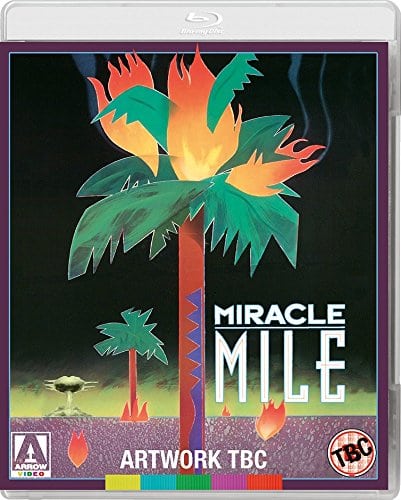

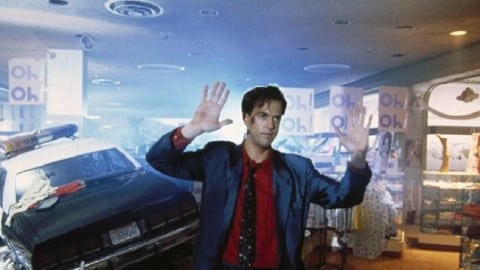



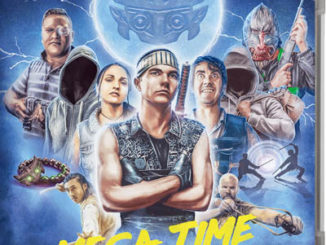
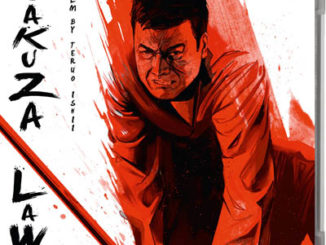
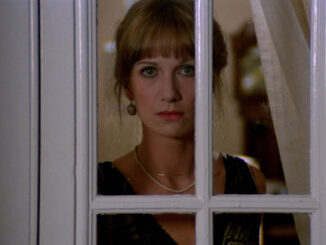
Be the first to comment